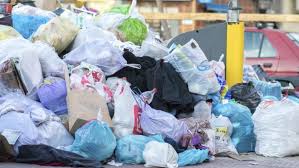The dilemma of plastic waste bags

The dilemma of plastic waste bags
Vipin Kumar
Dehradun , Feb 5
The increased quantum of sub standard plastic bags in the waste stream also indicates the misuse of electrical energy and water. The energy spent on making 10 thin plastic bags is equivalent to energy used in making one re-usable bag. The use of water for washing and granulation is ten times more than making a reusable bag from virgin plastics. In addition, the costs involved in collection and disposal make the entire process a taxing proposition. Further, the breaking down of thin film plastics into micro plastics of the size less than .5 millimetres due to photo degradation and mechanical abrasion . The tendency of the fragments for global movement due to wind and water can disrupt the food chain. It is not hypothetical, the pacific vortex and its threat to marine habitat is a well documented fact by the scientists.
At times, it is advocated that paper bags are a viable alternative to plastic bags. A simple empirical equation of its use for 130 crore people everyday can topple the advocacy cart, as most of the forests will be lost, forever. Besides, the quantum of water used in recycling paper is 40 times more than recycling plastic bags. In addition the use of bleaching powder for giving a colourless texture to paper leads to chlorine release through effluents discharged from the paper mills. On the user side, paper cannot carry wet vegetables and fruits as paper are not durable enough to withstand moisture. Yes, it did work well when the head count was low and people had the habit of carrying cloth bags from homes. It was a good habit but it died with the coming of plastic carry bags having self made features of being convenient and durable.
The use of cloth like bags made of poly propylene (PP) is on an upward swing. Undoubtedly it has a delayed end to its life cycle, but end it will, in the garbage dumps. The relative inconvenience in peeling out thread from the bags used in stitching is a disincentive for the recycler as it adds to the costs. It needs to be understood that recycled goods have to be low priced to compete with the articles made from fresh granules. The tailoring and moulding of bags is to be such that the entire operation becomes economically and financially viable. These bags possess the quality of being re-usable but none of us carry them from homes unless they are refused by the shop keeper like the Mother Dairy outlets in Delhi. It is also important to understand that these bags like the normal plastic bags are non- biodegradable. They disintegrate due to Ultra Violet rays of the Sun into micro plastics.
The so called green bags made from maize starch are an expensive product. They are being used in five star hotels where the customer hardly cares for the tariff and other costs. The bag being bio-degradable is a viable option for the environment but the cost is a deterrent for common use. In addition it emits carbon-di-oxide during decomposition adding to Green House Gases. However, in terms of scale of economies and environmental benefits the Green bag is not far from being accepted by the society. The city managers will have to plan aerobic composting system along with other degradable waste for checking the emission of Methane and carbon –di –oxide.
In the previous two write ups, issues of regulatory provisions and citizen’s responsibility were highlighted for evolving a participatory approach to address the menace of carry bags. What is important is to learn to use a carry bag rather than misuse it, as a disposal bag. Strategically, we have to change our habits and behaviour to be a responsible citizen. We need to educate our children and the community for managing our waste by adopting Prevention, Minimisation, Segregation and Recycling. There is no Government agency which can work in isolation. The community has to participate to share the common burden with the local self government to make our habitats liveable. Let us make a change at our level and then transform the society. Remember! charity begins at home.
( Vipin Kumar is an eminent environmentalist who has worked on waste management particularly in the Himalayan region for past more than three decades.)




